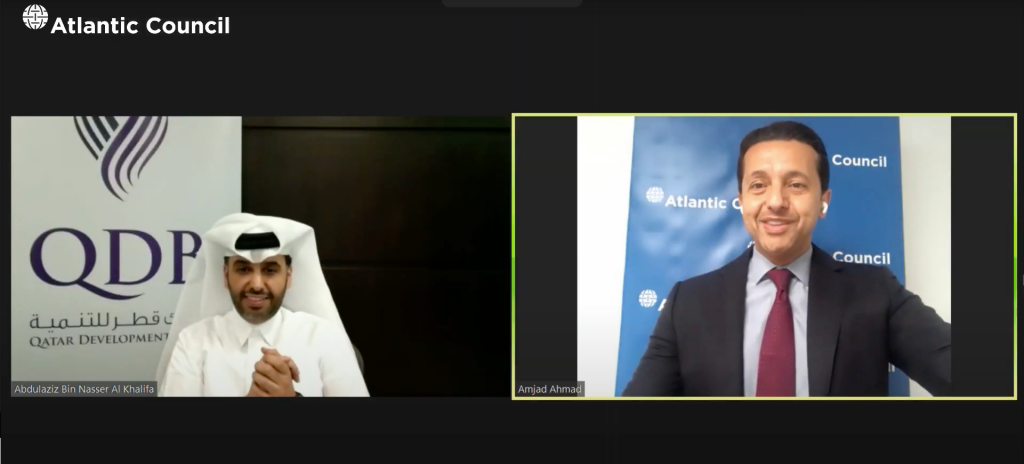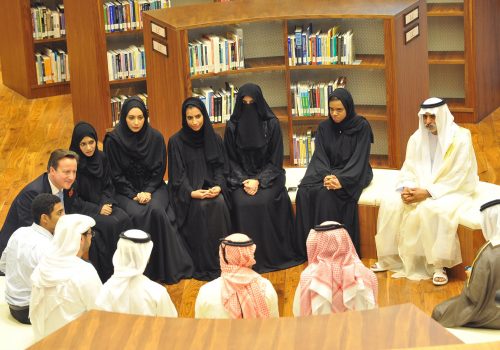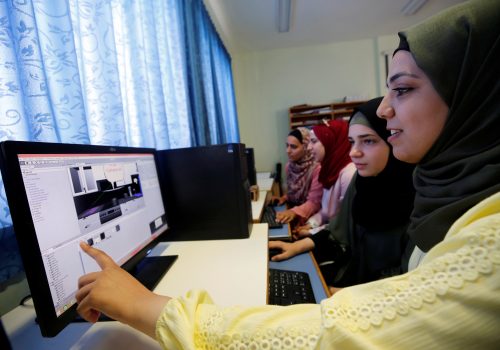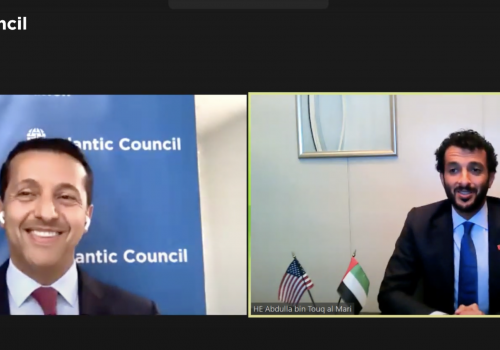On October 26, 2020, the Atlantic Council’s empowerME hosted Qatar Development Bank CEO Abdulaziz Bin Nasser Al Khalifa for a conversation about Qatar’s efforts to boost entrepreneurship, diversify its economy, increase women’s economic participation, and prepare youth for the jobs of the future. Below are the key takeaways from the discussion moderated by empowerME Director Amjad Ahmad.
Mission and work of Qatar Development Bank
- Al Khalifa noted the Qatar Development Bank (QDB) was established in 1997 as a tool for the government to promote entrepreneurship and ensure accessibility to financing for the private sector.
- QDB is focused on solving three issues to accelerate the growth of entrepreneurship and SMEs: (1) access to information, (2) access to funding, and (3) access to markets.
- Al Khalifa commented that changing mindsets regarding entrepreneurship is critical to growth. QDB aims to plant the seed of a future job as an entrepreneur – not a government employee – by providing information and training for SMEs, entrepreneurs, and middle school and high school students to convert ideas to projects that can add value to the economy.
- QDB provides accessibility to financing via direct lending and partial guarantees. QDB’s debt portfolio is currently around 9 billion Qatari riyal. With the blockade, this has played a big role in resilience. QDB also provides accessibility via VC vehicles; the focus is on technology-related start-ups. One of the biggest issues the Middle East faces is accessibility to venture capital financing. Venture capital is an underserved market, and this is hindering development of the entrepreneurial ecosystem.
- QDB works to provide accessibility to local and international markets. Since the government is the largest procurer of goods and services, QDB works to ensure SMEs and start-ups become the primary provider of services and goods to government.
- QDB plays a policy advocacy role too, Al Khalifa explained, by exempting SMEs from advance payment guarantees. In terms of international markets, QDB manages the trade promotion organization to match local exporters with international importers. QDB analyzes what is produced locally in Qatar and matches it with what other nations are importing.
The impact of the blockade that began in 2017 by Saudi Arabia, the United Arab Emirates, Bahrain, and Egypt
- Al Khalifa noted that the blockade was a blessing and a curse. He said: “What doesn’t kill you makes you stronger.” He added that the private sector found out there are gaps that they had to fill. He also said: “The globe is not the 4 countries [that are blockading]. Within 6-7 hours, there is north of half a billion people that Qatar can serve.”
- Trade with Turkey, Kuwait, Oman, and Iraq has grown since the blockade and will continue to grow, said Al Khalifa. He went on: “This blockade did not stop us from growing” and “the blockade prepared us for other shocks.”
- He noted that not a single shipment of energy exports has been missed since the blockade, saying: “We deliver on our business promises.”
- Al Khalifa added that when the blockade happened, the local private sector geared up and opened new plants and projects to support the local economy and QDB played a role by creating a situation room to identify gaps with SMEs and help match up them up with the government procurement system and give them priority.
Challenges due to COVID-19 pandemic
- Al Khalifa described extensive efforts to support the private sector during the pandemic. He noted that funding was earmarked to support private sector SMEs (both ex-patriate owned and Qatari citizen owned). QDB also established a situation room and has conducted more than fifty virtual training sessions for businesses and entrepreneurs on how to deal with human resources, supply chains, and other business issues.
- Qatar’s COVID-19 strategy is comprised of three phases: survive, revive, and thrive. The survive phase meant ensuring immediate accessibility to advice via a hotline for entrepreneurs and SMEs and linking them with emergency committees. The revive phase entailed ensuring SMEs received proper advice and funding. The thrive phase, which Al Khalifa says is what Qatar is going through currently, entails looking at how to convert challenges into opportunities. He spoke about technology start-ups that have expanded to different countries as well as QDB’s work to match those types of businesses with VC funding to scale effectively.
Diversification and competitive advantages
- Qatar’s area of strength in the region has been access to hydrocarbon, access to wealth, and human capital. “We have to ensure we are investing and preserving wealth for the future,” said Al Khalifa. He elaborated: “Now the assets need to create value and compete on a global level. We are doing this through a clustering approach. We are looking at what to double down on and how to expand on the value pockets. We can’t underestimate the role of national champions.”
- In terms of economic diversification, Al Khalifa stated that Qatar is working to grow non-hydrocarbon sectors and understands that exports are essential in terms of diversification. He added that it will be important to create government revenues that are non-hydrocarbon and reduce the leading role of the government in the economy. Qatar is installing legislation and access to credit to ensure that the private sector can play a bigger role and reduce government competition with the private sector.
- The challenge is how to become more competitive globally, said Al Khalifa, since Qatar is a small economy. Al Khalifa emphasized that Qatar’s financial sector is among the top performers locally and regionally and Qatar’s transportation sector is among the best.
- Al Khalifa stated that Qatar’s “economy quadrupled in the last twenty years and that growth has yielded good results for infrastructure such as an airport and ports.” He also pointed to recent IMF predictions that Qatar’s economy will grow in the coming years, unlike most others in the region.
- Just recently Qatar launched Qatar Fintech Hub and received more than 750 applications from more than 70 countries, Al Khalifa stated. Al Khalifa also highlighted Qatar’s infrastructure, transportation sector, ports, and airports as examples of what sets it apart.
- Al Khalifa noted that Qatar is blessed with natural resources, and that plays a role in Qatar’s wealth, but he added that Qatar is also blessed with wise leadership that has invested well in education.
How to grow the talent pipeline
- Since Qatar’s local population is small, Al Khalifa emphasized that “We are moving in terms of making sure that Qatar is a welcoming environment” and has changed laws in terms of owning real estate. He added that the kafala system has been removed and ex-patriates don’t have to obtain approval from a current sponsor to move to a new job. This is happening in neighboring countries too. Everyone in the region is looking at this as an area of opportunity and everyone is competing for talent, he noted.
- Al Khalifa said, “There are areas we are working on such as a permanent residency scheme we established a year and a half ago. We understand that talent is an important element.” He added that Carnegie Mellon, George Washington University, and other universities with campuses in Qatar are producing talented individuals, some who are Qatari and some who are not.
- Cultural change is also important, according to Al Khalifa, and in particular, planting the seed among the youth about entrepreneurship. In 2018 and in 2019, Qatar was ranked by the Global Entrepreneurship Monitor among the top in terms of youth who intend to start companies and there were equal numbers among males and females. Qatar is working to ensure its education system produces the right talent, said Al Khalifa.
Women’s economic empowerment
- Al Khalifa estimated that more than 30 percent of entrepreneurs are women and they are very active.
- He emphasized that both men and women are gaining access to all the services QDB provides and that women are playing a leading role in terms of leading start-ups and leading organizations
Food security and investing in agricultural projects
- Qatar is ranked among the top when it comes to food security. This wasn’t an accident—it was planned, said Al Khalifa. “We ensure we have the right logistical infrastructure for affordable and quality food for consumers. We’ve enhanced local production and have invested in agri-tech as a main area of focus,” he added.
- He explained that research is happening locally with R&D institutions and that a lot of the farms in Doha converted to be more productive. “It’s not easy to produce crops in Doha due to harsh weather, but technology helps. But that alone is not the right solution. We provide subsidized funding to local producers and logistical support” and created reserves and the right relationships between local private sector and international private sector markets, explained Al Khalifa.
FIFA 2022 World Cup
- “All countries that have hosted a big event have gone through economic fatigue. In Qatar we were privileged to have enough time to plan well. We are bidding and hosting more events to capitalize on the great infrastructure we’ve created. We want to create an amazing, unforgettable experience. This is a cup we want the Arab world to be proud of,” said Al Khalifa.
- Al Khalifa mentioned that Qatar started a competition for entrepreneurs to convert ideas relating to sports technology into projects. Qatar has opened up the competition to international ideas and start-ups with technology that can be incubated and accelerated and used for the World Cup and beyond.
Scale financing and growth capital
- Al Khalifa spoke about Qatar’s efforts to attract more foreign capital and compete with other markets, noting “We have been trying but have not been successful yet. Why would they come? Normally, for the government money. We want to change this. We are building an ecosystem that according to GEM is the best. But it requires different elements. One is accessibility to funding through equity. Qatar and the region needs this.”
- He explained that Qatar has been offering matching funds in sport tech. Qatar invites VCs working on sports technology to invest and then matches in hopes of becoming the hub of this type of start-up technology. Al Khalifa added: “We are the sport capital of the region. Sport technology VC is of immense importance.”
- Al Khalifa closed by saying that “Qatar has always been open for business.” He encouraged anyone thinking of starting a business to come to Qatar.
Stefanie H. Ali is deputy director of empowerME at the Atlantic Council’s Rafik Hariri Center for the Middle East. Follow her on Twitter: @StefHausheer.

empowerME at the Atlantic Council’s Rafik Hariri Center for the Middle East is shaping solutions to empower entrepreneurs, women, and youth and building coalitions of public and private partnerships to drive regional economic integration, prosperity, and job creation.



